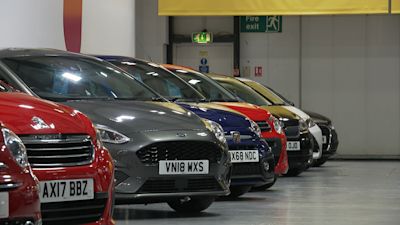What's being done to help the switch to electric vehicles and is it enough?

ITV News' Correspondent Lucy Watson reports on the drive to go electric
How we drive and what we drive are changing. There’s only one way we’re all heading, and that’s towards electric.
We visited Arrival, a company in Oxfordshire manufacturing electric vans, buses and ride-hailing vehicles. It felt like walking into tomorrow’s world. They have clients such as UPS, First Bus and Uber, with nearly £900 million worth of orders in the pipeline.
They concentrate on manufacturing commercial vehicles. I spoke to their Senior Vice President of Vehicle Programmes, Tom Elvidge."Things have really evolved in the six years we’ve been going now, the interest is only growing," he said.
"Every single aspect of the way that we’re designing, manufacturing & the technology that we’re using in these vehicles is brand new. It’s a hugely exciting place to work."
How has demand for electric vehicles changed in recent years?
Being inside the factory, you couldn’t help but feel excited by the technology and the direction of travel. Green vehicle manufacturing seems like it’s on the edge of a boom-time, with government targets fast approaching.In nine years time, you won’t be able buy a new car or van that is powered entirely by petrol or diesel. It will have to be fully electric. And although there’s no plan to ban the sale of second hand petrol & diesel vehicles, if you drive one you’ll most likely be taxed more.2030 is the target for cars and vans. On Wednesday, the government said 2040 will be when HGVs have to be zero emission too. The pressure is on all of us.
I met Belinda Old in Bristol. She is a mum of two daughters and is married to Paul who runs a development company. Both of them need to change the cars next year.
Paul needs a 4x4 style-truck and Belinda does relatively low mileage and just needs a run- around. They would like to go electric, but are coming up against too many obstacles.
"The price is horrendous compared to a petrol vehicle," Belinda says.
"£10, £15, £20 thousand difference for some cars. We’ve got four cars in our family, we’d all like an electric vehicle but the cost, the availability and the infrastructure is just not there."
Price is a barrier which explains why the popularity of electric vehicles is concentrated in more affluent areas of country. According to Autotrader, six of the top 10 EV (electric vehicle) hotspots are in the wealthier postcodes in London, in Putney and Kensington.
The pattern is the same outside the capital, with higher demand in towns like Harrogate, Bath and south Manchester. Those with the most interest in making the switch are twice as likely to have a household income of £75,000.I also spoke to Catherine Faiers who is Chief Operating Officer for Autotrader. She told me that, at the start of the year, one in 20 cars viewed on their site was electric. That figure has since jumped to one in five, but only about 10% of that interest translates into sales, with 38% of consumers saying the upfront expense puts them off. Furthermore, the issue of charging anxiety looms large.
"There are about 26,000 electric car charging points in the UK today and depending who you talk to there are different estimates but there are probably north of a million or so," she tells me.
"Whether the government is doing enough or as much as it could do to support the industry and infrastructure to shift the dial on the number of consumers actually buying an electric car, I think there’s a lot more to be done."Unsurprisingly, the Transport Secretary Grant Shapps disagrees.
"We’ve put in billions to the development of our infrastructure," he says.
"We have more electric chargers per major road network than any other country in Europe, in the UK. So we’re doing very well with it. But, in the end it’s a private enterprise we’re helping to grease the wheels if you like but in the end local authorities & private companies are going provide these things."
Ready or not, it will soon be out with the old, and in with the new but moving to electric is not a simple shift, albeit an essential one.